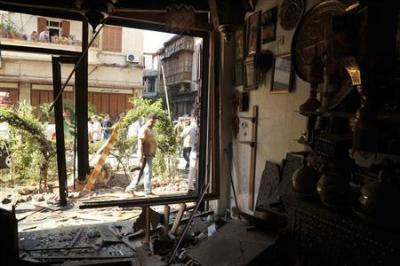As Western Powers Debate Military Action, Syria Christians Face Uncertain Future

Caught between the larger Sunni-Shi'a battles for supremacy in Syria, Christians are forced to contemplate an uncertain future as Western powers debate action against the government of Bashar al-Assad.
Syrian Christians are faced with a difficult situation due to their country's civil war. Many Christians support Assad out of fear that if he is overthrown and replaced by Islamists, they will face greater persecution, especially from al-Qaeda-linked Sunni Muslim rebel groups such as Jabhat al-Nusra, who have attacked Christians. At the same time, Assad and his government are supported by Iran and its Lebanese terror proxy, Hezbollah, and have used chemical weapons against the Syrian people.
Christian villagers in Wadi al-Nassara (Valley of Christians) in western Syria, home to around 50,000 Christians, have formed "popular defense committees" with the blessing of the Syrian government, according to AFP.
These "popular defense committees" are militias that are armed and trained by the Syrian government to supplement the Syrian army and protect their own neighborhoods or villages from attacks by rebels. Many of these militias are comprised of Syrian minority groups such as the Christians, Druze and Alawites.
While Assad may have links to Iran and Hezbollah, his secular government, led by the minority Alawites, has proven to be friendlier towards Christians than other regional elements, compounding the uncertainty surrounding Syrian Christians' future.
"The Syrian state provides more protection and freedom for Christians and religious minorities than any other Muslim-majority state in the region, including the regional allies (namely Jordan and Turkey) the U.S. has enlisted in the effort to overthrow it," Dr. John Eibner, CEO of Christian Solidarity International, a Christian human rights group that has extensively worked with Syrian refugees on the ground, told JNS.org.
At the same time, Eibner pointed out that there is no safe alternative for Christians with the rebel groups, who have largely been infiltrated by well-funded, organized and experienced Al-Qaeda terrorists.
"No existing rebel group in Syria has demonstrated a similar commitment to the protection of religious minorities or an ability to provide the basic functions of the state, and many rebel groups—some of the most powerful of which are allied to al Qaida—are guilty of acts of religious cleansing against Syria's minorities. Those who propose to attack or overthrow the Syrian state are responsible for ensuring the safety of all of Syria's citizens after its fall," Eibner said.
Emanuel Aydin, a bishop in the Syria Orthodox Church, told the Washington Times in early August that he estimates about 300 Christians have been killed in the Syrian civil war, and about 500,000 have fled.
Syrian-born Melkite Catholic Patriarch Gregoire III Laham also warned against Western intervention in Syria.
"Instead of trying to change the (Syrian) government, help the government to change. We are all for change. We are all for reforms. But not in this way, with blood," Laham recently told Catholic News Service.
Indeed, Christian leaders in Syria have a reason to fear for their future. They have also faced growing dangers from rebels in Syria.
In April, two Syrian bishops, Yohanna Ibrahim and Boulos Yaziji, were kidnapped at gunpoint at a rebel checkpoint near Aleppo. Their whereabouts are still unknown.
In early July, a video posted on LiveLeak.com apparently showed Syrian Catholic priest Father Francois Murad being beheaded by the Al-Qaeda-linked Syrian rebels, Jabhat al-Nusra, in front of a cheering crowd. While there are conflicting reports over whether or not that was Murad depicted in the video, the Vatican has confirmed that Murad and two others were taken from a monastery in northern Syria and killed.
In late July, an al-Qaeda linked group abducted Italian Jesuit Priest Paolo Dall'Oglio, who is well-respected by many Syrians and has worked for years to restore Deir Mar Musa or Monastery of Saint Moses the Abyssinian, an ancient Christian monastery located 80 kilometers north of Damascus, into a modern center for Muslim-Christian interfaith dialogue.
Home to numerous Christian denominations that date back to the foundation of Christianity in the first century CE, today Christians comprise between 5 to 10 percent of Syria's estimated 22 million people, down from more than 20 percent just a century ago.





















